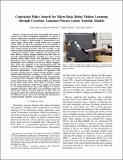Por favor, use este identificador para citar o enlazar a este item:
http://hdl.handle.net/10261/219850COMPARTIR / EXPORTAR:
 SHARE
BASE SHARE
BASE
|
|
| Visualizar otros formatos: MARC | Dublin Core | RDF | ORE | MODS | METS | DIDL | DATACITE | |

| Título: | Contextual policy search for micro-data robot motion learning through covariate Gaussian process latent variable models |
Autor: | Delgado-Guerrero, Juan Antonio CSIC ORCID; Colomé, Adrià CSIC ORCID ; Torras, Carme CSIC ORCID | Fecha de publicación: | 2020 | Editor: | Institute of Electrical and Electronics Engineers | Citación: | IEEE/RSJ International Conference on Intelligent Robots and Systems (IROS) (2020) | Resumen: | In the next few years, the amount and variety of context-aware robotic manipulator applications is expected to increase significantly, especially in household environments. In such spaces, thanks to programming by demonstration, nonexpert people will be able to teach robots how to perform specific tasks, for which the adaptation to the environment is imperative, for the sake of effectiveness and users safety. These robot motion learning procedures allow the encoding of such tasks by means of parameterized trajectory generators, usually a Movement Primitive (MP) conditioned on contextual variables. However, naively sampled solutions from these MPs are generally suboptimal/inefficient, according to a given reward function. Hence, Policy Search (PS) algorithms leverage the information of the experienced rewards to improve the robot performance over executions, even for new context configurations. Given the complexity of the aforementioned tasks, PS methods face the challenge of exploring in high-dimensional parameter search spaces. In this work, a solution combining Bayesian Optimization, a data-efficient PS algorithm, with covariate Gaussian Process Latent Variable Models, a recent Dimensionality Reduction technique, is presented. It enables reducing dimensionality and exploiting prior demonstrations to converge in few iterations, while also being compliant with context requirements. Thus, contextual variables are considered in the latent search space, from which a surrogate model for the reward function is built. Then, samples are generated in a low-dimensional latent space, and mapped to a contextdependent trajectory. This allows us to drastically reduce the search space with the covariate GPLVM, e.g. from 105 to 2 parameters, plus a few contextual features. Experimentation in two different scenarios proves the data-efficiency and the power of dimensionality reduction of our approach. | Descripción: | Trabajo presentado para la International Conference on Intelligent Robots and Systems (IRos), en Las Vegas, Nevada (Estados Unidos) del 25 al 29 de octubre de 2020 | URI: | http://hdl.handle.net/10261/219850 |
| Aparece en las colecciones: | (IRII) Comunicaciones congresos |
Ficheros en este ítem:
| Fichero | Descripción | Tamaño | Formato | |
|---|---|---|---|---|
| 2358-Contextual-policy-search-for-micro-data-robot-motion-learning-through-covariate-Gaussian-process-latent-variable-models.pdf | 662,69 kB | Adobe PDF |  Visualizar/Abrir |
CORE Recommender
Page view(s)
117
checked on 15-abr-2024
Download(s)
137
checked on 15-abr-2024
Google ScholarTM
Check
NOTA: Los ítems de Digital.CSIC están protegidos por copyright, con todos los derechos reservados, a menos que se indique lo contrario.
